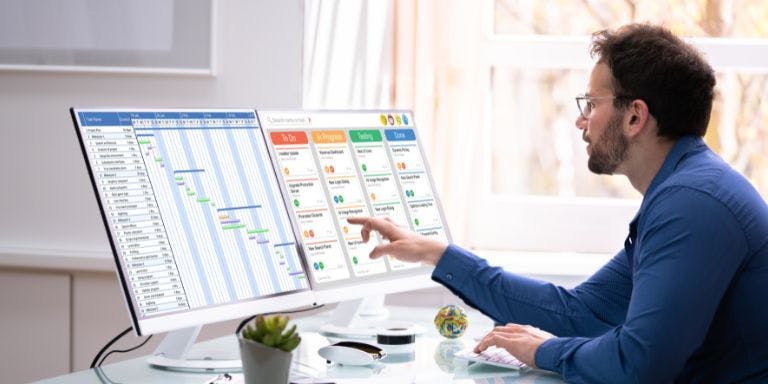First published on Friday, July 12, 2024
Last updated on Tuesday, October 15, 2024
Tracking employee time accurately is an integral part of owning a business with a plethora of benefits for both you and your employees. In today’s fast-paced environment, accurate employee time tracking has never been more crucial.
For you, having this data ensures that you have an accurate log of employee hours and that your records are compliant. And for your employees, it means every hour of their hard work is logged, allowing you to compensate them correctly for their time.
This, in turn, means that you’ll limit the risk of getting hit with hefty fines—it’s a win-win.
Read on to discover the many benefits of accurate time tracking as well as the significance of accurate reporting and the potential risks and pitfalls of inaccuracies. Let’s dive in.
The importance of accurate time tracking
So, why exactly is tracking employee time accurately so important? Well, for one, it provides payroll accuracy, which is a cornerstone for trust and morale within the workforce. It also ensures that you are compliant with current labour laws.
Keeping a precise record of employee working hours means that you’ll stay on the right side of the law. Failing to do so can put your company at risk of legal penalties and disputes.
Overpaying or underpaying employees comes with a long list of complications, including wage and hour lawsuits that can tarnish the reputation of your company not to mention lead to hefty legal fees and financial instability.
Time tracking accuracy also has the added benefit of driving operational efficiency, so prioritizing it is vital.
Methods for tracking employee hours
We’ve established the importance of accurate employee time tracking, but what method of tracking is best for your business? There are various employee hour tracker methods available, ranging from traditional to modern.
Let’s take a look at the options you may consider using for your business.
Traditional time tracking methods
Let’s start with the oldest time-tracking methods:
Manual timesheets: This traditional time tracking method for employees was originally popular for its flexibility and accessibility as employees could fill out a manual timesheet anywhere. However, manual timesheets are prone to errors and entering the data into the system by hand is a time-consuming task.
Punch clocks: This traditional time-tracking method requires employees to clock in and out physically using a card or a badge. While this method is simple and cost-effective for companies, punch clocks have limited capabilities compared to advanced technology and aren’t suitable for workplaces with remote employees.
A traditional employee hours tracker might be cheaper than modern time tracking methods, but their potential drawbacks, such as errors and fraud risk often outweigh the positives.

Modern time-tracking methods
Let’s take a look at the various modern time-tracking methods on offer for your business:
Employee time tracking software: This modern solution has the advantage of accurate and real-time employee hour tracking and minimizes the chance of errors. It has the capability to generate detailed reports that include employee hours as well as attendance and overtime. This advanced option can also be integrated with payroll and accounting to streamline the payroll process.
GPS-based tracking: Modern technology now allows employee hours to be tracked by monitoring employee location. This method allows maximum transparency for remote workers with real-time data. The downside to this method is that it relies on GPS movements, which require your employees' consent and may raise compliance challenges.
Mobile apps: A time tracking app for employees allows an organization to track their working hours via their smartphones. The upside to this is convenience and flexibility, but the downside is that it relies on an employee having sufficient phone battery and internet access.
The modern methods detailed above offer major benefits including accuracy, flexibility as well as real-time data.
Best practices to track employee hours accurately
To successfully track employee hours, you will need to implement several best practices.
Here's how:
- Establish time tracking policies: A clear and concise time tracking policy sets expectations for clocking in and clocking out, as well as recording breaks and overtime. For maximum success, ensure that your time tracking policy is communicated to employees via an employee handbook, training sessions and regular reminders.
- Training and guidance: Provide employees with sufficient training and guidance on time tracking, highlighting the importance of accuracy and its impact on payroll and overall business operations.
- Standardize time tracking: To ensure consistency and accuracy, a standardized procedure should be rolled out throughout the organization to avoid confusion.
- Utilize technology: Invest in an automated employee time-tracking software that provides real-time data. Take advantage of features such as time clock integration, automated reminders, real-time tracking and geolocation tracking.
- Encourage accountability: Teach employees the importance of accountability and encourage them to take ownership of their time-tracking responsibility.
- Communicate effectively: Open communication is critical to ensuring clarity and understanding.
Establishing the above best practices has many benefits for the organization and the employees alike.
How BrightHR can help with accurate tracking
Inaccurate employee time tracking can lead to compliance issues, such as non-compliance with labour laws or overtime regulations. This can result in legal consequences, reputational damage, and financial losses. Not to mention, it can make it challenging for you to plan and schedule work effectively, leading to inefficiencies in operations.
But you can make inaccurate time tracking a thing of the past with BrightHR’s innovative time-tracking software. Manage staff hours, breaks and overtime easily and efficiently and keep an accurate record of vacation time and absence with a simple-to-use tracking software and mobile app.
BrightHR handles all your time-tracking needs, leaving you with more time to handle other areas of responsibility and focus on company growth strategies. Book a free demo today and see for yourself how we can help you track employee time easily and efficiently.









